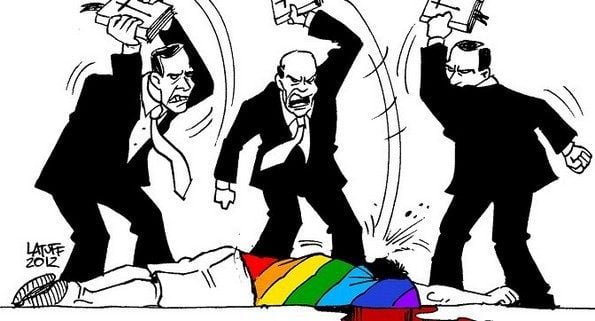
Guest Post by MJ Lisbeth
When I was verging on thirteen, my family moved from Brooklyn, New York to a small New Jersey town that was turning into a bedroom community for New York commuters.
I forgave my parents for that move when I turned 40.
Seriously, any sort of disruption is difficult for someone entering puberty. In previous posts, I discussed how conservative my old neighborhood—blue-collar, white, and Roman Catholic—was. While our new community was more middle-class and not as Catholic, it was, in some ways even more conservative—and religious. Or, at least, the prevailing attitude is perhaps more influenced by religion.
Some of that, I believe, had to do with the light and physical space. In Brooklyn, we lived in apartments until I was eight. Then my parents bought a row house, where we lived until we moved to New Jersey. That house, the apartment buildings, and most other structures in the neighborhood were constructed from bricks flaked and bubbled but somehow held together and insulated the people within them like the worn coats of old people. Those bricks, those houses, simmered softly in summer heat and glowed like embers at sunset, and echoed stories shared on stoops and over hearty meals.
There were no bricks on our block in New Jersey. In fact, there were few anywhere in the town, except in one of its older sections. Oh, and I was older than the house we moved into, or any of the others on our street. They were single-story or split-level, with no basements—or stoops. So neighbors couldn’t sit outside and chat unless one invited the other into their yard or house. The fronts of those houses were flat, painted in flat shades of white and beige.
Almost everybody I knew in my Brooklyn neighborhood attended the same church, in the middle of our neighborhood. Many of us also attended its Catholic school. Ironically, as much as we talked, and kids played with each other, we interacted very little, if at all, during Mass. If anything, the church served a purpose that, I would learn much later, Elizabeth I envisioned for the then-new Church of England: It wasn’t so much a unifying faith as much as a social glue. In other words, she cared more about attendance than belief. Likewise, we—even those of us who attended the church’s school– didn’t talk much, if at all, about our notions of the triune God but we all knew enough to attend or “assist” at mass on days of obligation.
The New Jersey town had a Roman Catholic parish, which I attended, as well as churches and chapels of the mainline Protestant denominations. If I recall correctly, there was also an Evangelical church, but I (and, I suspect, almost anybody who didn’t attend it) didn’t know what it was. On Sunday morning, the streets—quiet except when people were on their way to work or school—were all but deserted, as most people were in one of those churches. I don’t recall any open hostility or even debates between members of different churches, but there didn’t seem to be much communication between the leaders of those churches, or between members of churches about matters related to their institutions and faith.
As I described in an earlier post, my Catholic school in Brooklyn was, in essence, a Northern segregation academy. It opened around the time courts ordered the busing of Black and brown kids from other neighborhoods–”trouble,” as some called them—into public schools in white neighborhoods like ours. Our New Jersey enclave was “spared” such a fate because, well, there weren’t Black or Brown kids to bus to the school. I recall only one Black classmate: an extremely intelligent and talented girl whose family had a farm on the outskirts of town and, I would learn later, were descendants of a community of free Blacks and escaped slaves that once lived in the area. I would love to know how many times that girl and her family heard “we don’t mean you” from white people talking about the race “problem.”
I knew only one kid who attended the Catholic high school: an athlete whom the public high school (from which I graduated) barred from its football and track teams because of a medical condition. My guess is that other kids went to that school because their parents really wanted a Catholic education for their kids—or, perhaps, they wanted to protect their progeny from lowlifes like me!
So, that school didn’t have to be a segregation academy. But, in a sense, the town itself was one. I don’t know whether the local shade of skin has darkened any since I left, more than four decades ago, but it seems that some members of the local Board of Education are trying to “shield” kids from “unsavory” influences, just as they moved to the town to forget, and to keep their kids from knowing about, the darkness and rough edges in the bricks of the cities they left.
Lest you thought that only the likes of Ron DeSantis and Greg Abbott are trying to eradicate the existence of LGBTQ kids in the name of “parental rights,” consider this: the town I’m talking about—Middletown Township (ironically, the home of Governor Phil Murphy) has just mandated the “outing” of transgender and other gender-variant kids. Under the new policy, if, students ask to be called a different name or identified by a different gender from the one on their birth certificates, ask to use the bathroom, or participate on a sports team or other activity designated for the “opposite” gender, teachers must notify those kids’ parents.
(Three other New Jersey municipalities, including one that borders Middletown and another in the same county, have proposed policies with nearly identical language.)
Now, I understand parents wanting to know what their children are doing, in school or elsewhere. But I also know how vulnerable such kids are: After all, I was one, though I didn’t “come out” and begin my gender affirmation process until I was in my 40s. Moreover, from other experiences, I know of the perils some young people face. When I taught in a yeshiva, boys confided questions about their sexual orientation, or simply their wish to know what life was like outside the Orthodox bubble, to me. (One also talked about sexual abuse from a rabbi.) Later, as a college instructor—both before and after my gender affirmation—students came to me with questions and fears they couldn’t express to members of their families and communities. And, when I co-facilitated an LGBTQ youth group, I worked with 14 and 15-year-olds who were kicked out of their homes or bullied out of their schools when they “came out.”
Some of those parents who disowned their gay, trans, or genderqueer students, no doubt, thought they could “protect”–segregate– them from the “influences” of people like me. And, by getting rid of the “bad apple,” they can keep the rest from “spoiling.”
It’s hard for me not to think that the same kinds of people who supported Catholic Northern segregation academies like the one I attended in Brooklyn are also behind the proposals to out kids in the name of “parents’ rights”– in order to segregate other children from the ungodly influences of kids like the one I might’ve been had I the language or awareness to define myself, and those teachers and other adults who might’ve been my allies.
Bruce Gerencser, 66, lives in rural Northwest Ohio with his wife of 45 years. He and his wife have six grown children and thirteen grandchildren. Bruce pastored Evangelical churches for twenty-five years in Ohio, Texas, and Michigan. Bruce left the ministry in 2005, and in 2008 he left Christianity. Bruce is now a humanist and an atheist.
Connect with me on social media:
Your comments are welcome and appreciated. All first-time comments are moderated. Please read the commenting rules before commenting.
You can email Bruce via the Contact Form.








